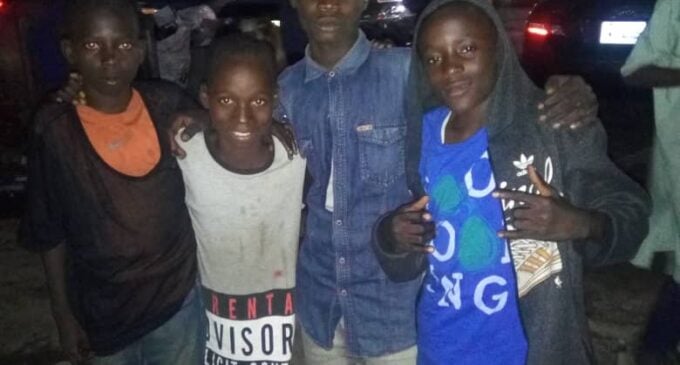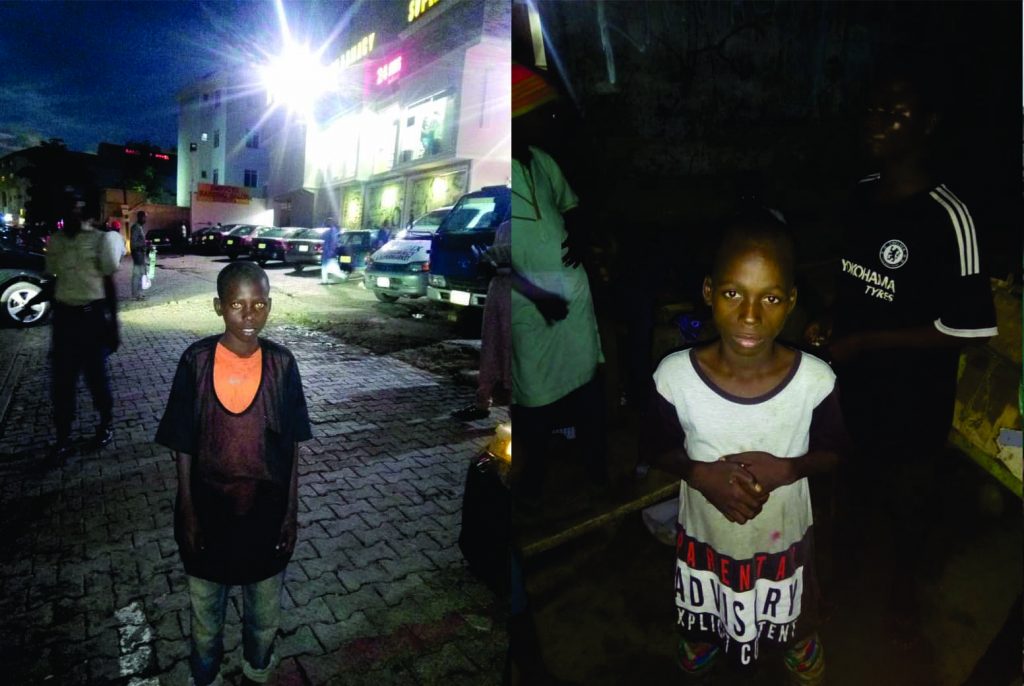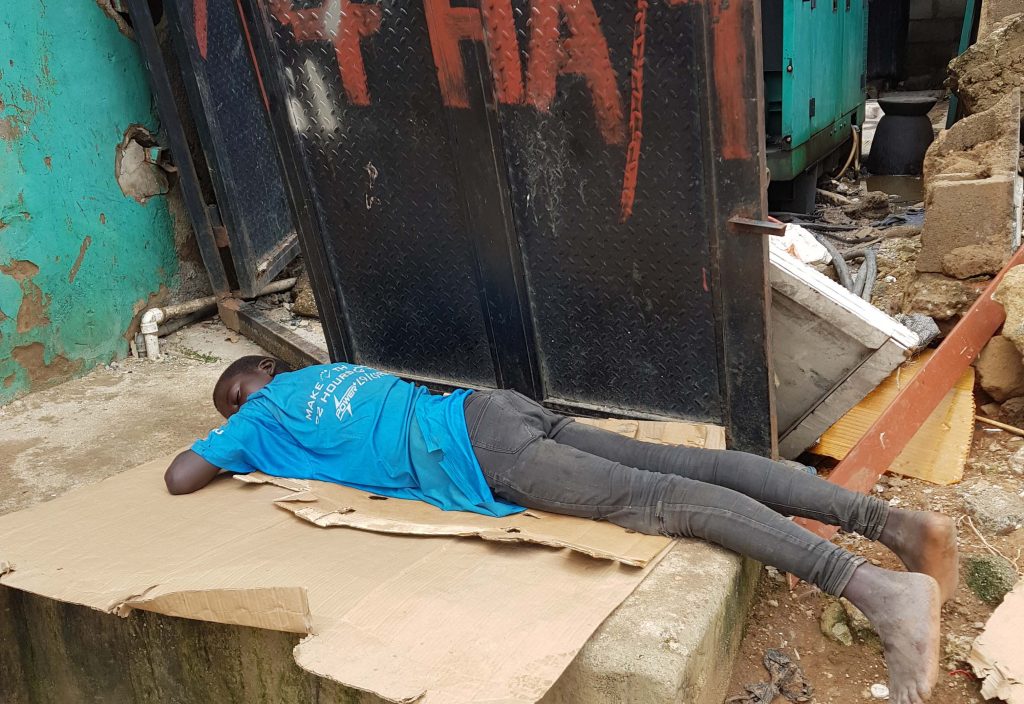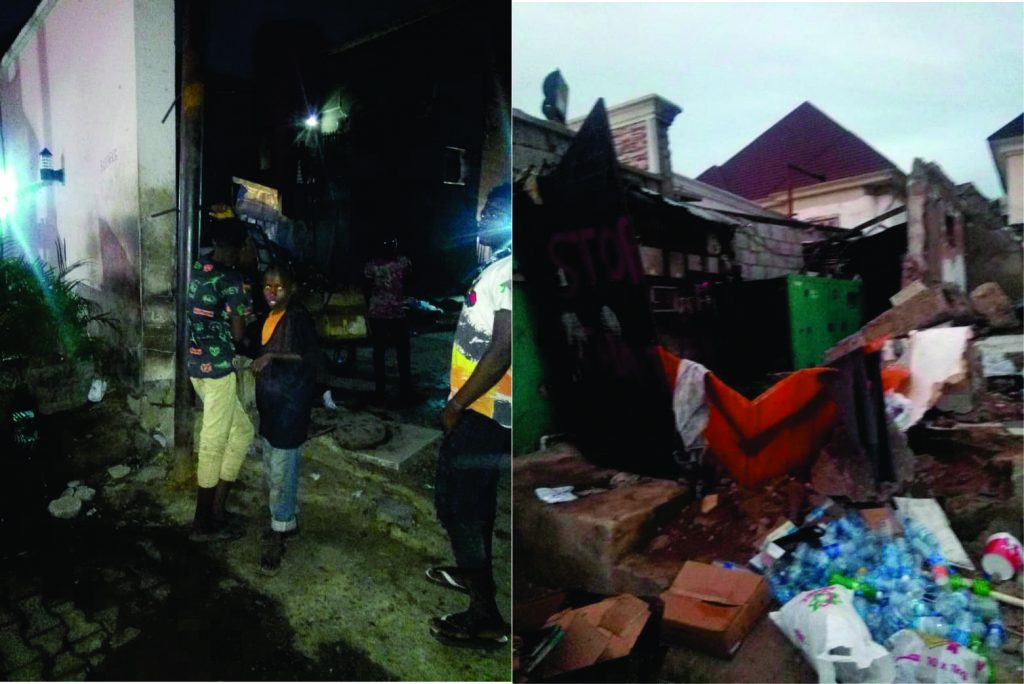Abuja is the city where children beg at night

For Mohammed Mohammadu who wants to be a Custom officer, his parents do not know whether he is alive or dead. And he seems not understand what that means. Mohammed is a nine-year-old who makes his daily living by standing around the corner shops of around Wuse 2, one of Abuja’s busiest streets, every night, to beg Abuja urban middle class dwellers who come to buy their daily necessities at shops after a hard day’s job.
He is not the only one who stands at night to beg or solicit to carry the wares of shoppers in other to be given some money. There are many others like him – hungry, frail and unbothered about any danger and lurking around aiming to be noticed for some crumbs from the pockets of strangers every night. Follow me as I tell you how I got to know about Yusuf and the stories of other boys like him too who beg at night in Abuja.
As I sat at the outside chair of the burger shop close to the popular H-Medix superstore on this Friday night, sorely from the day’s work, hoping to grab a snack and drink, after which I would of think what next thing to do after the Access bank ATM on the very busy Ademola Adetokunbo road did not pay me the money I sought to withdraw from it, when I heard some freakish noise and turned to know where it came from, it was then I saw them running out from a place I couldn’t fathom, they were boys – about five children in group. The noise coming from them was that it seemed they were arguing over something. Their voices were in Hausa. I understand Hausa in the fluent sense. So I strained my ears to pay close attention to them. It was then I made out what their argument was about – it had to do with money – someone had given them money to share and they had turned it into a quarrel.
I became curious – I wanted to know who those children were. My journalist instinct was pushing me. I asked the guy sitting close to me – and who was waiting for his order – too, who those children were, and he said he doesn’t know them, but usually saw them around every night, lurking around shops and parked cars to beg strangers who came to either shop or grab something to eat at the same burger shop we were seated outside of. What the guy told me made me decide that I was going to return to those children to know their story. Who really were they? Why do they have to beg on the streets of Abuja every day at night? Were they sent? And if yes, by whom? Who sent them on this incredulous errand? Was it their parents? Or who? These children – boys from my making were between the ages of 9 and 12. They shouldn’t be begging. Not anywhere in the world and not on the streets of Abuja – at night even. They are children. Children shouldn’t beg for whatever from strangers at night. They should be in their homes, safely in bed or reading some children books or perhaps watching cartoons on TV at that time of the day.

Ismail (left) waiting for strangers to beg for money but Mohammed (right) wants to be a Customs officer
I returned as I promised myself in other to know the stories of those boys. The time was 6:15. It was on a Wednesday – early evening. As I approached from across the road, a bit of a distant end, I saw a boy laying on the floor of a cement block. Others, 3 in number were standing around – chatting and looking curiously around. I crossed the road and head over to their side. Those 3 saw me and were looking at me as I brought out my phone and took the photo of the boy sleeping. I made eye contact with them as I said ‘Sannu’, a common greeting in Hausa. They chorused back with Sannu. In other to make them feel comfortable and to make my face a little familiar, I asked them if they knew another supermarket aside from the one we were standing close to. I had asked in Hausa. They all nodded but only one spoke and told me to go upwards a bit, that I would find one called 4U. I thanked them and went away, but not without telling them I would be back. I wanted to wait out a while for it to be dark before I come back to them to interact and question them and capture the way they live – on a daily basis.
“I am just standing around to help people with their wares to their cars and they sometimes give me small money to help me eat.” This was Mohammed telling me when I got back, in a wry voice accompanied bya face wearing uncertainty when I asked him in Hausa why he is always here – at this spot – H-Medix supermarket at night. I had told him that the last time I was there, pointing at the H-Medix, I saw him and these same group of boys begging. I said that to let him know our meeting was not some kind of coincidence. I also said that to calm his probably frayed nerves and that I meant no harm – to him and the others – his friends. He told me that they would sometimes direct the cars on where to park for convenience sake. I asked if they were paid by the management of the shops around the area, he said no. I looked up to the other boys to collaborate his story. They all said no – they weren’t being paid. I asked him for how long has he been living in Abuja while depending on people’s generosity to be able to feed, he said he came here from Jos two years ago. This is not the story of Mohammed only.
There is Ismail Nuhu, a shy looking 11-year-old, who was wearing a raggedly shirt that I can’t seem to identify its original color on black shorts with a haircut, I’m sure was done with a razor blade. He came from Jos with an older friend who later abandoned him to care for himself. Ismail would like to become a headmaster. I ask him how he understand what it means to be a headmaster. He lets out a smile at me and says, “When I was in Jos, I used to pass by a school every morning on my way to the farm and used to see a man who always stood at the entrance of the school with a cane telling the students to run into the school and one day I asked my older brother who the man was and he headmaster.” I couldn’t help with the laughter. It was funny but also heartbreaking to see the condition of this poor boy. He survives daily by begging on the street at night.
And there is Inuwa Ibrahim, who came to Abuja two years ago driven in the back of a pick-up van from Zamfara, a northwest state in Nigeria. “I came here to help myself because nobody cared for me while I was still at the village.” This was what he told me when I asked him how he came to Abuja. Inuwa was taking a nap when I met him. By the time I came back 30 minutes later, he already was up. That was when I spoke to him. Begging strangers at night on Ademola Adetokunbo is the only kind of life Inuwa understands in other to survive daily. It is the only way he is used to. He cannot understand is that he is supposed to be in the comfort of his parents’ home, going to school and reading his books.
How do you even explain such necessity to him? Would he even try to understand the importance of reading and learning through the window of books? In economics, there is the scale of preference. For 9-yearold Inuwa, feeding his stomach is the utmost preference in the scale of life economics. Books can wait forever. Which child reads when hungry? Only that in his case compared to the rich and average Nigerian kid who can choose to eat whatever and whenever they like, food is not available unless he begged to feed himself. When I asked Inuwa if he would like to go to school if given the opportunity. He said no. ” I want to be a businessman selling plenty wares like that big shop there.” He wants somebody kind enough to help with funds to start his dream business.
For Murtala Isah, the possibility of becoming a Judge is a one he is sure he can live to become. He says he is the peacemaker in their group whenever there is a fight among them. Usman who is 10 came from Kano with a trader whom he begged to allow him follow him to Abuja so he can be his boy, run errands for him and serve him. “Sometimes, I ate only once in the day and go would go hungry without food some days. My master sells oranges around here. It was here I met these boys and decided to join them to help people carry their loads to their car so I can be given money to feed myself.” That was how he came to join the group in begging for alms from people at the corner shops in Wuse 2 every night.

Inuwa taking a nap before ‘night duty’
Usman Musa is also 10 years old as Murtala. He would like to return to his state – Kaduna and go to school. He said he was has only been in Abuja a year, “Shekara daya”. I had asked him for how long he has been here. “My parents are in Kaduna and it’s up to a year I saw them last. I would like to go back home and see them but don’t have the transport fare. When I asked him to how he got here, he said he came in a car that was carrying foodstuff.
How can I forget Hassan Habu who told me he wants to become the President of Nigeria?As a 12 – year old, his dream is valid but how does he access the education and skills he needs to live out his dream
In my conversation with all of them in Hausa language – it is the only language they understand, one thing is certain – they would like to be off the streets. They dream of going to school. They are willing to live a normal life. For some of them, they would like to return to their original communities and be reunited with their families and be able to go to school from their homes. But for some, they would prefer to stay in Abuja and be enrolled in school – they are not eager to return home. There are some things they all have in common. They all know their surnames. Every one of them told me their last names. They all know their ages too. For some, they know the complete date of their birth but for others, they just know the year only. They also commonly know exactly what they would like to become in life.

This is where they call home
What does the Child Rights Act say?
Although the Child Rights Act was adopted in Nigeria in 2003 by the Federal legislature and signed into law by former President Olusegun Obasanjo, it can only be effective if States in Nigeria take the policy in earnest. The Child Rights Act (CRA) was created to domesticate the Convention on the Rights of the Child (CRC) and to legally document and protect the rights and responsibilities of children in Nigeria, but it seems it ends on paper only as most State government do not care for the development of Nigerian Children. This is evident in the number of out of school children in Nigeria and those living on the streets. Nigeria has about 11 million out of school children – both boys and girls. The Child Rights Act gives the Nigerian child certain inalienable rights of which I will just mention a few. They are: The right to survival and development, the right to name, the right freedom of association and peaceful assembly, the right to freedom of thought, conscience and religion, right to leisure, recreation and activities, right to health and health services, right to parental care and maintenance, and right to free, compulsory and universal primary education.
The story of these boys is not one in isolation. There are many children living in the streets in Nigeria. While it is a fact that the Nigeria’s Child Rights Act provides for children rights, what continues to be a mirage is the actual implementation of those rights both at the federal and state level. What we fail to understand that when we deliberately refuse to care for the overall development of our children, what we get as an after effect are teenagers and adults who become malignant and take to crimes and social vices that put our nation backward. A 2012 survey conducted by Economist Intelligence Unit ranked Nigeria as one of the worst countries in the world for children or a child to be birthed. What more can I add.
A visitor in Abuja for the first time?
If you are yet to visit in Abuja wherever you are right now in the world and reading this story, land planning to visit sometime soon, let me welcome you to the capital of Nigeria – Abuja where children between the ages of 7 and 9 beg at night to survive the harsh realities of living in one of the most expensive capital cities in the African continent. When you are visiting Abuja for the first time in the heart of the city, you will be taken in by the magnificent buildings, arrays of street lightening, well-structured roads and hundreds of strangers who look well fed and happy and are busy, but what you wouldn’t get to know immediately or may never know is that children beg on the streets of Abuja at night.
As a young woman who grew up in Abuja and has lived there for almost two decades, it was shocking for me to find out that there are children beggars in Abuja city centers and realizing also that they only come out at night to beg. For these boys, it is the only life they know -to wake up in the morning and do some little chores and wait for downfall to go and stand by parked cars of strangers to beg for money, however little it might be. Whether it’s 10 or 20 or 50 or 100 naira note, they are usually delighted to take it from you, thanking you profusely with ‘Nagode’ in Hausa which means “Thank you” in English. These impressionable young boys are still begging on the streets, endangering their lives as I write this story. They are have no future, not because they cannot dream but because they are deprived, dejected and lack a direction for their fragile lives.
After my encounter with them, I made them an offer, “Should I take all of you to go eat dinner or give you the money equivalent.” I felt that I couldn’t just possibly leave them without somewhat of a ‘Thank you for your time’. In just 10 seconds of what seem like silence and swiftly looking at one another, they agreed that I should give them the money. I made for my bag – bringing out naira notes. But there was a bit of problem – who do I give the money to? I had I recalled my first time of noticing them – they had been fighting over money. I thought it was best I shared the money among them. You would think that would work. After I gave two of them their own share of money and I made to give the third, holding a 500 naira note, a forceful grab from one of the boys made away with the money. I was taken by shock by that act. It was night – almost 8pm. I couldn’t identify who did that in that split seconds. There was riot already. I turned my back to head home, wondering in my mind at vulnerability of these boys while asking myself if that was how they would go on to live – their lives – until when?
For Mohammed, Ismail, Inuwa, Usman, Murtala and Hassan and scores of others, the only choice is to beg or die from hunger.















There are no comments at the moment, do you want to add one?
Write a comment